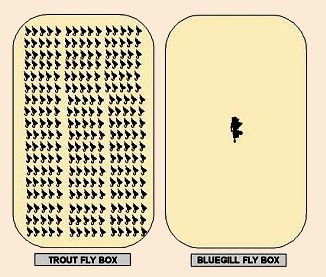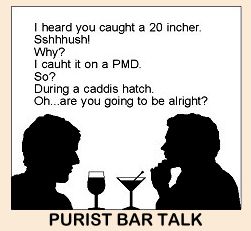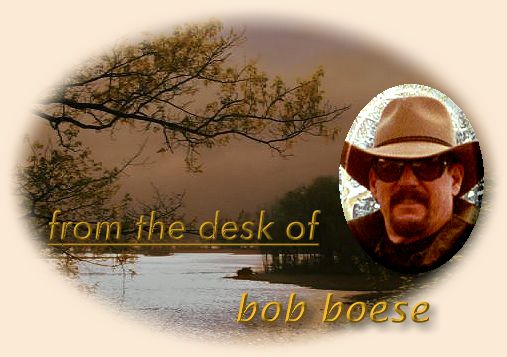|
Fly fishing purists are a joy to be around. Not because of
their witty repartee, or their cutting edge insight, or their
intra-fisherman social graces and streamside fashion sense,
But because fly fishing should be a happy occasion. Purists
make you laugh.
Consider the lowly bluegill, one of the fish world's great
survivors, a spunky fighter, a staple for a healthy bass
population, a unique and spectacular breeder, and the
bane of purists. The state of Maine (where they think
good coffee is the color of tea) considers bluegill to be
an exotic and dangerous species, officially referring to
the spread of the bluegill population as an "epidemic."
It seems the bluegill's aggressive and prolific nature threatens
Maine's native brook trout. Even though bluegill are most
active in Maine only 3-4 months out of the year, they are
said to cause irreversible changes to entire aquatic ecosystems
by restructuring plankton and forage fish communities, and
because strategies to eliminate or control bluegill are difficult
to design and implement, and almost entirely ineffective.
Bluegill are tough.
In Japan's Lake Biwa, a new bluegill population threatens
native carp and eels and the Japanese, who are particularly
good at killing (and eating) anything that swims
(no dolphin-free tuna there), can't kill out our favorite
panfish. Bluegill are resilient.
In South Africa, where apartheid apparently still applies
to fish, the bluegill is considered an "alien invader" and has
put 15 indigenous fish species on the road to extinction
because of bluegill predation on fish fry and invertebrate
food for native species. Bluegill overcome.
Fly fishing purists consider trout and salmon the only respectable
freshwater game fish. For some reason, a fish that can't survive
in water hotter than 58? doesn't seem all that remarkable.
Admittedly, ice fishing is merely an excuse to drink beer, but
while some bluegill are caught below the ice, others can be
found in the hottest waters of the tropics. Bluegill are a hardy
breed.
Consider also that trout and salmon spawn in redds on rare
occasions. Bluegill romance in a bed at least annually and
with different partners. Trout are often caught on soft rods
with a size 24 fly on 7X tippet and must be handled very
delicately to survive on release. Bluegill get downright
belligerent with anything smaller than a size 10 on 6lb. test
and managed to live to breed again with a hooked-out eye
or gill plate.
 Trout are measured in inches because hanging
them on a scale is gauche. Bluegill are measured in how
many filets to a plateful. Purists clean foreign materials off
of their waders before they enter a trout stream. Bluegill
fishermen change from their snake-proof boots to
grease-from-the-truckbed coated hip boots before challenging
a gator for best spot on the bayou. Trout fishermen concentrate
their fishing times around insect hatches. Bluegill fishermen just
buy DEET. Purists are enraptured by the beauty of the nature
and the environment around them. Bluegill fishermen figure if it's
not wet it's not worth watching. A purist's vest looks like he
shoplifted FeatherCraft. A blugill fisherman uses whatever fits
in bluejean pockets. A purist may carry hundreds of flies in
dozens of patterns. A bluegill fishermen carries what worked
yesterday. Trout and salmon must live in clear streams. Bluegill
thrive in anything wet. Purists start fishing when they have disposable
income. Bluegill fishermen attach a rod to the stroller. A purist
buys a license and permit, reads stream reports and hatch charts,
hires a guide and complains about stream access but honors Posted
signs. A bluegill fisherman downs a case of beer with the pond
owner before filling his ice chest with bigguns. A purist won't
drive his Navigator down a dusty woods road. A bluegill
fisherman made the road pushing down trees with his front bumper.
A purist is committed to a favorite rod. A bluegill fisherman uses
the one with the tip that wasn't broken in the pickup door. A purist
stakes out his beat on a stream and glares at intruders. A bluegill
fisherman shows you where he's catching fish and what to cast there.
Trout are measured in inches because hanging
them on a scale is gauche. Bluegill are measured in how
many filets to a plateful. Purists clean foreign materials off
of their waders before they enter a trout stream. Bluegill
fishermen change from their snake-proof boots to
grease-from-the-truckbed coated hip boots before challenging
a gator for best spot on the bayou. Trout fishermen concentrate
their fishing times around insect hatches. Bluegill fishermen just
buy DEET. Purists are enraptured by the beauty of the nature
and the environment around them. Bluegill fishermen figure if it's
not wet it's not worth watching. A purist's vest looks like he
shoplifted FeatherCraft. A blugill fisherman uses whatever fits
in bluejean pockets. A purist may carry hundreds of flies in
dozens of patterns. A bluegill fishermen carries what worked
yesterday. Trout and salmon must live in clear streams. Bluegill
thrive in anything wet. Purists start fishing when they have disposable
income. Bluegill fishermen attach a rod to the stroller. A purist
buys a license and permit, reads stream reports and hatch charts,
hires a guide and complains about stream access but honors Posted
signs. A bluegill fisherman downs a case of beer with the pond
owner before filling his ice chest with bigguns. A purist won't
drive his Navigator down a dusty woods road. A bluegill
fisherman made the road pushing down trees with his front bumper.
A purist is committed to a favorite rod. A bluegill fisherman uses
the one with the tip that wasn't broken in the pickup door. A purist
stakes out his beat on a stream and glares at intruders. A bluegill
fisherman shows you where he's catching fish and what to cast there.
Bluegill fishermen require only one good fly, but look in the
bluegill fisherman's jeans pocket and you might find as many
as five patterns because every yesterday might be just a little
different. What you might see are:
1) Poppers. Cork, foam or balsa doesn't matter, if it floats
it's fish food.
2) Sponge spiders. Bluegill don't care what it looks like,
it might be a bug, so eat it.
3) Soft hackles. It takes a lot of little bugs for a meal
so bluegill eat them all.
4) Chenille flies. Colored, fat, slim or woven, bluegill
see and think snack time.
5) Terrestrials. Ants, beetles and hoppers —
when the wind blows the menu does too.
If you don't have a fly that works, ask a bluegill fisherman
to borrow one, but don't be surprised if what you get is a
bit chewed up and eaten on. Remember, you asked for
what works.

~ Bob
About Bob:
Robert Lamar Boese has fly fished for five decades. He is an
environmental negotiator, attorney and educator who has provided
environmental legal services for more than thirty-three years including
active duty with the U.S. Coast Guard and Department of Justice. He is a
well known fly tyer with several unique patterns to his credit. He has
developed and authored federal and state regulatory programs
encompassing a broad spectrum of environmental disciplines, has
litigated environmental matters at all levels of the federal and state
court systems, and is a qualified expert for testimony in environmental
law. He has authored over 60 published text chapters, comments or
articles on environmental matters, is a member of the Colorado, District
of Columbia and Louisiana Bar Associations, and is a certified mediator.
In addition to his legal practice, Mr. Boese has been a high school
teacher, an associate professor of Environmental Law and Public Health,
has authored numerous fiction and sports publications, and is a softball
coach and nationally certified volleyball referee. He is the president
of the Acadiana Fly Rodders in Lafayette, Louisiana and editor of
Acadiana on the Fly. He has been married for thirty years and is the
father of two fly fishing girls (25 and 21). For additional information
contact: Boese Environmental Law, 103 Riviera Court, Broussard, LA 70518
or call 337.856.7890 or email coachbob@ymail.com.
|

 Trout are measured in inches because hanging
them on a scale is gauche. Bluegill are measured in how
many filets to a plateful. Purists clean foreign materials off
of their waders before they enter a trout stream. Bluegill
fishermen change from their snake-proof boots to
grease-from-the-truckbed coated hip boots before challenging
a gator for best spot on the bayou. Trout fishermen concentrate
their fishing times around insect hatches. Bluegill fishermen just
buy DEET. Purists are enraptured by the beauty of the nature
and the environment around them. Bluegill fishermen figure if it's
not wet it's not worth watching. A purist's vest looks like he
shoplifted FeatherCraft. A blugill fisherman uses whatever fits
in bluejean pockets. A purist may carry hundreds of flies in
dozens of patterns. A bluegill fishermen carries what worked
yesterday. Trout and salmon must live in clear streams. Bluegill
thrive in anything wet. Purists start fishing when they have disposable
income. Bluegill fishermen attach a rod to the stroller. A purist
buys a license and permit, reads stream reports and hatch charts,
hires a guide and complains about stream access but honors Posted
signs. A bluegill fisherman downs a case of beer with the pond
owner before filling his ice chest with bigguns. A purist won't
drive his Navigator down a dusty woods road. A bluegill
fisherman made the road pushing down trees with his front bumper.
A purist is committed to a favorite rod. A bluegill fisherman uses
the one with the tip that wasn't broken in the pickup door. A purist
stakes out his beat on a stream and glares at intruders. A bluegill
fisherman shows you where he's catching fish and what to cast there.
Trout are measured in inches because hanging
them on a scale is gauche. Bluegill are measured in how
many filets to a plateful. Purists clean foreign materials off
of their waders before they enter a trout stream. Bluegill
fishermen change from their snake-proof boots to
grease-from-the-truckbed coated hip boots before challenging
a gator for best spot on the bayou. Trout fishermen concentrate
their fishing times around insect hatches. Bluegill fishermen just
buy DEET. Purists are enraptured by the beauty of the nature
and the environment around them. Bluegill fishermen figure if it's
not wet it's not worth watching. A purist's vest looks like he
shoplifted FeatherCraft. A blugill fisherman uses whatever fits
in bluejean pockets. A purist may carry hundreds of flies in
dozens of patterns. A bluegill fishermen carries what worked
yesterday. Trout and salmon must live in clear streams. Bluegill
thrive in anything wet. Purists start fishing when they have disposable
income. Bluegill fishermen attach a rod to the stroller. A purist
buys a license and permit, reads stream reports and hatch charts,
hires a guide and complains about stream access but honors Posted
signs. A bluegill fisherman downs a case of beer with the pond
owner before filling his ice chest with bigguns. A purist won't
drive his Navigator down a dusty woods road. A bluegill
fisherman made the road pushing down trees with his front bumper.
A purist is committed to a favorite rod. A bluegill fisherman uses
the one with the tip that wasn't broken in the pickup door. A purist
stakes out his beat on a stream and glares at intruders. A bluegill
fisherman shows you where he's catching fish and what to cast there.
